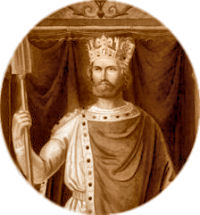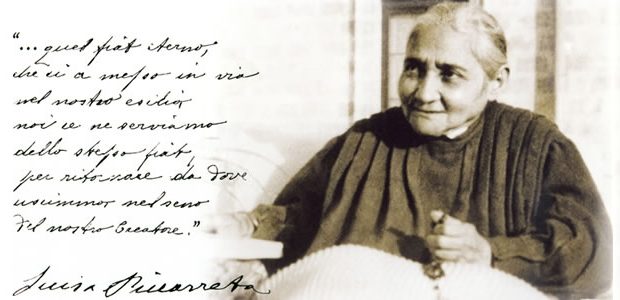St. Benedict cured him.
A Pope sought refuge in his kingdom, whence at the proper time
he was restored to the Holy See.
Henry II, successively Duke of Bavaria, King of Germany and Emperor, devoted himself to the spread of religion by rebuilding churches and founding monasteries. Until the end of his life he displayed the virtues of a great saint. Together with his wife, St. Cunegunda, he founded the bishopric of Bamberg and, at his death in 1024, was buried in the cathedral there; his holy wife was laid by his side fifteen years later. According to the 1962 Missal of St. John XXIII the Extraordinary Form of the Roman Rite, St. Henry’s feast is celebrated on July 15.
Saint Clelia Barbieri, whose feast is celebrated in Italy, was the Foundress of the Congregation of the “Suore Minime dell’Addolorata”. She has the distinction of being the youngest founder of a religious community in the history of the Church. St. John Paul II canonized her on April 9, 1989.
Historically today is the feast of St. Mildred the first abbess of the English monastery of Minster-in-Thanet founded by her mother, Saint Ermenburga. As a nun who mortified herself with frequent fasts, Mildred was characterized by an exceptional humility, gentleness, and serenity of spirit. She was remembered for her compassion to widows, orphans, the poor, and the troubled. Her death came at the end of a prolonged and painful illness. Following the translation of Mildred’s body to Canterbury in 1033, her relics became highly revered by the city’s pilgrims.
St. Henry
Henry, surnamed the Pious, Duke of Bavaria, became successively King of Germany and Emperor of the Romans; but not satisfied with a mere temporal principality, he strove to gain an immortal crown, by paying zealous service to the eternal King. As emperor, he devoted himself earnestly to spreading religion, and rebuilt with great magnificence the churches which had been destroyed by the infidels, endowing them generously both with money and lands. He built monasteries and other pious establishments, and increased the income of others; the bishopric of Bamberg, which he had founded out of his family possessions, he made tributary to St. Peter and the Roman Pontiff. When Benedict VIII, who had crowned him emperor, was obliged to seek safety in flight, Henry received him and restored him to his see.
 Once when he was suffering from a severe illness in the monastery of Monte Cassino, St. Benedict cured him by a wonderful miracle. He endowed the Roman Church with a most copious grant, undertook in her defense a war against the Greeks, and gained possession of Apulia, which they had held for some time. It was his custom to undertake nothing without prayer, and at times he saw the angel of the Lord, or the holy martyrs, his patrons, fighting for him at the head of his army. Aided thus by the divine protection, he overcame barbarous nations more by prayer than by arms. Hungary was still pagan; but Henry having given his sister in marriage to its King Stephen, the latter was baptized, and thus the whole nation was brought to the faith of Christ. He set the rare example of preserving virginity in the married state, and at his death restored his wife, St. Cunigund, a virgin to her family.
Once when he was suffering from a severe illness in the monastery of Monte Cassino, St. Benedict cured him by a wonderful miracle. He endowed the Roman Church with a most copious grant, undertook in her defense a war against the Greeks, and gained possession of Apulia, which they had held for some time. It was his custom to undertake nothing without prayer, and at times he saw the angel of the Lord, or the holy martyrs, his patrons, fighting for him at the head of his army. Aided thus by the divine protection, he overcame barbarous nations more by prayer than by arms. Hungary was still pagan; but Henry having given his sister in marriage to its King Stephen, the latter was baptized, and thus the whole nation was brought to the faith of Christ. He set the rare example of preserving virginity in the married state, and at his death restored his wife, St. Cunigund, a virgin to her family.
He arranged everything relating to the glory or advantage of his empire with the greatest prudence, and left scattered throughout Gaul, Italy, and Germany, traces of his munificence towards religion. The sweet odor of his heroic virtue spread far and wide, till he was more celebrated for his holiness than for his imperial dignity. At length his life’s work was accomplished, and he was called by our Lord to the rewards of the heavenly kingdom, in the year of salvation 1024. His body was buried in the church of the blessed apostles Peter and Paul at Bamberg. God wished to glorify His servant, and many miracles were worked at his tomb. These being afterwards proved and certified, Eugenius III inscribed his name upon the catalogue of the saints.
Excerpted from The Liturgical Year, Abbot Gueranger O.S.B.
Patron: Basel, Switzerland; Benedictine Oblates; childless people; disabled people; dukes; handicapped people; kings; people rejected by religious orders; physically challenged people; sterility.
Symbols: Sword and church; lily; crown; dove on an orb; model of Bamburg cathedral.
Things to Do:
- Read more about St. Henry and his wife, St. Cunegund.
- St. Henry was a Christian emperor who acted justly. It is all too obvious today what a danger it is to have leaders who do not value the God-given dignity and rights of each human person. Offer a Mass, make a holy hour or say a rosary for your elected officials.
